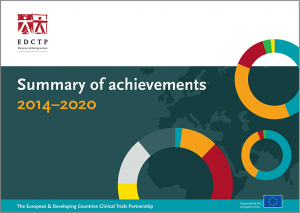2020 End of Year Message by Michael Makanga, EDCTP Executive Director
Dear Colleagues, Partners and Friends,
This year has been extremely difficult due to the negative impact of the COVID-19 pandemic. Despite these challenges, our project portfolio has grown by 31.4% and the programme is providing €752.74 million of funding to EU–Africa research partnerships – involving 19 European and 41 Africa countries – advancing new interventions for key infectious diseases affecting sub-Saharan Africa, while also strengthening clinical research capacity in African countries. For more details explore our new summary of achievements.
Research and development through clinical trials and product-focused implementation research make up the bulk of our portfolio, and our total investment has now reached €634.6 million (about 84% of total grant funding), supporting 123 clinical research grants, several of which involve multiple clinical trials. Of these, 63% are phase II and III trials and many focus on highly vulnerable populations, including pregnant women, newborns, children and adolescents. A further 17% of projects are post-licensing (phase IV) studies, including product-focused implementation studies, generating evidence highly relevant to policymakers.
In the area of capacity development (about 16% of our grant funding), we have now invested in 196 individual fellowship grants, supporting the career development of current and aspiring African scientific leaders. Another set of 240 Africa trainees are benefiting from hands-on-training in the context of larger clinical research grants (among others: 21 post-doctoral fellows, 112 PhDs, and 79 master’s students). Moreover, a cohort of 120 epidemiologists and biostatisticians will be trained through a joint initiative launched this year with the Africa CDC. Overall, presently the long-term training activities have 44.5% female participation, and the regional diversity gap is progressively being bridged.
We are also helping to develop an enabling environment for clinical research, by strengthening national regulatory and ethical review capacities – with 37 countries benefiting from such grants. As part of our long-term strategy to capacity development, we have renewed the support for four regional networks of excellence following their satisfactory mid-term evaluation. Other ongoing activities include three grants to build national pharmacovigilance activities and several new grants to build capacity to use research evidence in policymaking, are in grant agreement preparation.
The COVID-19 pandemic is a vivid reminder of the continuing threat posed by emerging infections. This year, we launched an emergency COVID-19 funding initiative, supporting 25 international research collaborations. In addition, our two large EDCTP-funded consortia – ALERRT and PANDORA-ID-NET – are working to enhance the capacity of African regions to prepare for and respond to infectious disease outbreaks and are actively involved in the COVID-19 response. Furthermore, potential support of COVID-19 research was created within EDCTP’s 2020 calls for proposals by expanding their disease scope accordingly.
In the area of EU coordination, EDCTP Participating States’ total cash contribution has grown to €171.17 million by the end of 2020. Additionally, a total of €995 million through 280 European Participating States’ Initiated Activities (PSIAs) has been committed through the EDCTP 2014-2020 work plans.
As part of the African participation, the 16 sub-Saharan African countries which are a member of the EDCTP Association, have submitted 120 Participating States’ Initiated Activities (PSIAs) with a total committed value of €67 million through the EDCTP 2014-2020 work plans.
Partnerships are core to our work. At the end of 2020, 244 African and 171 European institutions in 68 countries (41 in sub-Saharan African, 19 in Europe and 8 other countries) are involved in EDCTP projects. In addition, we have leveraged financial contributions of €367 million (total cash and in-kind) from global partners through joint calls and strategic calls for proposals requiring co-fonding. Details of these are summarized in our summary of achievements.
In the area of cooperation with other EU initiatives, United Nations, and development cooperation agencies, we have three ongoing projects, which secured financial support from the US Agency for International Development (USAID) and the Swedish International Development Cooperation Agency (Sida). We expect to support up to 15 new projects from the recently concluded evaluation of the second strategic call requiring co-funding from development cooperation agencies. Additionally, 17 EDCTP African member countries participated in a first EDCTP-WHO survey to inform the development of a strategic policy plan for strengthening health research systems capacities of countries in sub-Saharan Africa. The second online survey on national health research systems has recently been launched.
This year we launched the EDCTP knowledge hub hosted by The Global Health Network to share information on clinical trial planning and management. Our tenth EDCTP Forum was postponed to 2021 due to the COVID-19 pandemic.
Significant progress has been made in preparation for the successor programme to EDCTP2 – the EU-Africa Global Health Partnership: EDCTP3. In August 2020, the European Commission published its proposal and a committee has been set up for operationalising the future programme.
To conclude, I take this opportunity to thank everyone involved in the EDCTP programme for your unwavering efforts and contributions during the year towards our achievements.
I wish you all together with your families and significant others a blessed festive season and a fruitful 2021.
Michael Makanga

